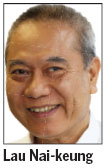Junketeers damage city's reputation
Updated: 2013-09-10 07:12
By Lau Nai-keung(HK Edition)
|
|||||||||
The Bo Xilai trial tells us two things. First, the nation's new leadership is dead serious about curbing corruption. Contrary to expectations from some corners, the anti-corruption campaign is going to be here to stay. In fact, it is now transforming from a campaign into something more regular and institutional. Skeptics need look no further than the lukewarm luxury goods sales data for proof.
Another point worth noting is the difficulty of establishing a corruption case. It is not uncommon on the mainland for children and spouses to receive bribes which the officeholder in question may or may not be aware of. Legal ownership (or even equitable ownership) of assets is often ambiguous and uncertain; the provision of benefits in exchange is often unnoticeable. All these add to the challenge of fighting corruption.
We in Hong Kong are luckier. Our institutions and legal system make it easier for us to detect and prevent graft. We should be putting these to good use, but unfortunately we aren't.
Recently, the Berlin-based Transparency International ranked Hong Kong 14th globally in its Corruption Perceptions Index, down two places from 12th in its previous report. This is the city's lowest ranking on the index since 2007, and although according to the report Hong Kong is still the second-least corrupt area in Asia after Singapore, it is a warning sign.
Responding to the report, an Independent Commission Against Corruption (ICAC) spokesperson said some prominent corruption cases widely reported in the media might have affected people's perception of Hong Kong. "From another perspective, that the ICAC busted these cases shows we will not tolerate graft and are determined and efficient in fighting corruption," he claimed.
Indeed that might be the case. Among the city's most prominent anti-graft cases last year was the investigation into the Kwok brothers - Thomas Kwok Ping-kwong and Raymond Kwok Ping-luen, and unfortunately former chief secretary Rafael Hui Si-yan was also implicated together with the two property tycoons. The case led us to wonder how widespread and how bad the collusion between certain high-ranking government officials and the property business is, but until today exposure of the relevant facts has been limited. (In theory a case should not be discussed while it is still ongoing, but in practice only the very rich enjoy these privileges. On the other hand, Chief Executive Leung Chun-ying's allies were given a great deal of exposure when they were in trouble.)

Cases busted will not do long-lasting damage to our image as a graft-free city. In the long run it has the effect of deterring other cases from happening. What really hurt us, both in perception and in reality, are the cases that are not busted, such as the recent Cathay-gate.
In the Cathay-gate case, people who went on a junket were exposed, but mysteriously no one was investigated. They were grilled by the press for a day or two, and then everything returned to business as usual.
Hong Kong's Prevention of Bribery Ordinance sets a very straight standard for public servants, which is defined as "any prescribed officer and also any employee of a public body and in the case of a public body any member of the public body." The Legislative Council (LegCo) is a public body, according to the Ordinance, and therefore councillors are public servants.
Section Four of the Ordinance specifies, "any public servant who solicits or accepts any advantage as an inducement to or reward for performing duties shall be guilty of an offense." Similarly, Section Five of the Ordinance says, "any public servant who solicits or accepts any advantage as an inducement to or reward for giving assistance or using influence in matters relating to a contract shall be guilty of an offense."
The French trip was obviously an inducement for the junketeers to support a third runway, which fell under the mercy of LegCo. The "advantage" and the "inducement" are clear beyond reasonable doubt. Among them, Albert Ho Chun-yan is on the board of the Airport Authority and he has an added conflict of interest.
The fact that the junketeers came from both political camps does not mean that they are not guilty of the offense. In reality, similar forms of graft are prevalent in the city. Let's dig all of them out, and not be complacent about ourselves. In the end, we may find to our surprise, that we are not that much cleaner than the mainland.
The author is a member of the Commission on Strategic Development.
(HK Edition 09/10/2013 page1)